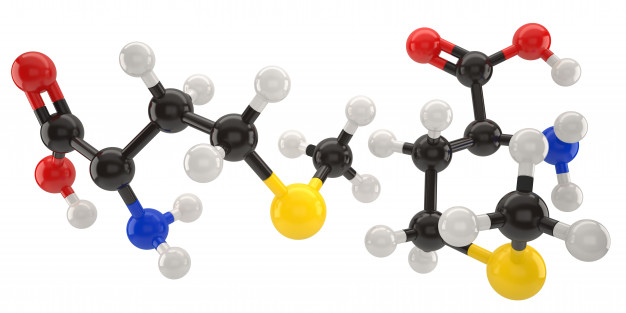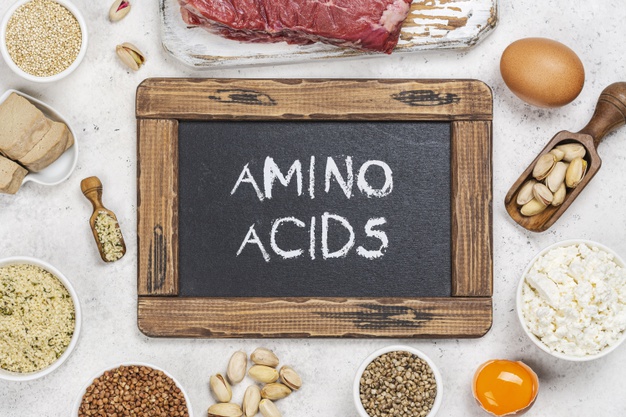Methionine is an essential amino acid that helps to synthesize several proteins in body. Body cannot produce methionine hence it should be consumed through diet for fulfilling its need. Body requires methionine for various purposes such as for promoting cellular function, for inhibiting hepatic damages, for re-synthesizing cells and tissues and for promoting wound healing. It also helps to treat various degenerative diseases.
Chemistry
- It is an alpha amino acid
- It is also considered as an aliphatic amino acid
- It is known as sulphur containing amino acid as well
- It is non-polar
- It contains a carboxylic group, an amino group and S-methyl thioether side chain
- It has the formula of C5H11NO2S
- It is white in colour
- It is generally found in solid form or in crystalline powdered form
- It has a faint odour
- It is soluble in water but it has seen that crystalline form of methionine is fairly water repellant at first
- It can also be solubilized into warm alcohol but insoluble in benzene, petroleum ether, acetone and absolute alcohol
- The most important characteristic feature of methionine is its lipotropic activity, which is responsible for preventing excessive fat accumulation in liver


Type
- There are two type of methionine found, which include D-methionine and L-methionine
- These two forms of methionine have similar structure but they are mirror image of each other
- Mixture of these two forms are generally called as DL-methionine
Source
Methionine is widely available in dietary proteins (especially in animal proteins) hence consumption of protein rich food can easily fulfill its requirement.
Foods rich in methionine are listed below –
- Turkey
- Poultry
- Beef (especially skirt steak)
- Lean pork chops
- Egg
- Fish (especially tuna, halibut, cod, sunfish etc)
- Tofu
- Low fat ricotta cheese
- Milk and dairy products
- White beans (large)
- Brazil nuts
- Quinoa
Health benefits
Methionine and cellular function
- Methionine is responsible for producing several important bio molecules in body, which are essentially required for the normal functioning of cells
- Methionine helps to synthesize cysteine (an amino acid), which is further utilized for synthesizing taurine and glutathione
- Taurine helps to promote cellular functionality whereas glutathione acts as strong antioxidant that helps to protect the body from free radical induced oxidative damages
-
 Methionine is associated with promoting the metabolism of several nutrients as well
Methionine is associated with promoting the metabolism of several nutrients as well - It also helps in the synthesis of DNA
Methionine and DNA
- DNA is a nucleic acid that carries genetic information. Various factors are responsible for changing some aspects of DNA, which are associated with modifying the genetic makeup of an organism and this modification can be harmful or harmless
- Methionine plays significant role in these phenomena. It has seen that methionine is converted into SAM, which can change the DNA by adding a methyl group in it
- Amount of methionine in diet determines the magnitude of changes occurred in DNA due to SAM
- It has seen that addition of methyl group to DNA is related with decreasing the prevalence of colorectal cancer. Though this methylation of DNA can be detrimental in some cases also
Methionine and hepatic health
- Consumption of methionine is extremely beneficial for promoting liver function
- It acts as lipotropic agent (stated above) thus helps to prevent fatty infiltration of liver by inhibiting fat deposition in liver cells
- It helps to lessen the risk of developing fatty liver disease as it prevents liver cell necrosis
- It also helps to delay the onset of liver cirrhosis
- It helps to promote the health as well as the functionality of gall bladder and decreases the susceptibility of developing gall stones

Methionine and acetaminophen poisoning
- Overdose of acetaminophen or Tylenol can cause various health complications like nausea, vomiting, losses of appetite, hypertension, severe pain in the upper side of the abdomen and these can be easily prevented by consuming methionine. It is better to consume an oral dose of methionine before 10 hours of acetaminophen poisoning
- It has seen that methionine is responsible for preventing the byproducts of Tylenol from harming the liver
Methionine and Parkinson’s disease
- Parkinson’s disease is a disorder of central nervous system, which adversely affect the movement. A decrease in dopamine level due to the damage of nerve cell is considered as the main causative factor of Parkinson’s disease
- Consumption of methionine is very beneficial for improving the symptoms of Parkinson’s disease as it is associated with improving the body’s ability to control movements
Methionine and exercise
- It has seen that consumption of methionine especially L-methionine plays significant role in supporting intense, short exercise
- It acts as the precursor of creatine, which helps to supply short term chemical energy to the muscle that ultimately helps to enhance the endurance
Methionine and connective tissue
-
 L-methionine is essentially required by the body for producing collagen, which is considered as the primary component of connective tissue
L-methionine is essentially required by the body for producing collagen, which is considered as the primary component of connective tissue
Methionine and artery
- L-methionine helps to improve the health of artery by inhibiting fat accumulation within it hence decreases the risk of developing atherosclerosis
- It also plays significant role in preventing the hardening of artery thus associated with promoting blood circulation

Medicinal uses
Methionine is extensively used for numerous medicinal purposes. Diseases, which can be treated by methionine consumption, are listed below –
- Asthma
- Urinary tract infection (UTI)
- Pancreatitis
- Allergy
- Side effects of radiation
- Schizophrenia
- Depression
- Harmful consequences of microbial infestation (especially Herpes simplex virus and Human papillomavirus)
- Its consumption also decreases the prevalence of colon cancer and breast cancer
- It has seen that consumption of adequate methionine during pregnancy significantly reduces the risk of developing neural tube defects
Recommended dietary allowance
- The recommended dietary allowance of methionine is considered as 14 mg per kg of ideal body weight for adults
- It should be consumed as per recommended amount for avoiding the risk of developing its deficiency disorders and hyperactivity
Deficiency disorders

Inadequate intake of protein mainly the animal protein is responsible for developing methionine deficiency. It has seen that vegans are at high risk of developing methionine deficiency. Methionine deficiency can causes various health hazards, which are listed below –
- Skin lesions
- Fatty liver
- Edema
- Hair loss
- Muscle weakness
- Poor moods
- Poor cellular functions
- Children whose diets are lack in methionine have experienced great growth faltering
Thus it is better to consume methionine as per recommendation for reducing the risk of developing methionine deficiency. If it is not consumed through diet then methionine supplements should be consumed.
Side effects
- Consumption of too much methionine (more than the recommended amount) is responsible for developing methionine hyperactivity and causes various health complications such as, digestive disorders, acidosis, hepatic disorders etc
- It is not wise for administering methionine intravenously especially to children
- It is better to consult with health expert before consuming methionine supplements regarding the dose of respective supplements
- It is always better to consume methionine from diet where as excessive consumption of supplements may cause toxicity
- Women during pregnancy and lactation phase should avoid the consumption of methionine supplements

Source:
Elango, R., 2020. Methionine nutrition and metabolism: insights from animal studies to inform human nutrition. The Journal of Nutrition, 150(Supplement_1), pp.2518S-2523S.
Kaiser, P., 2020. Methionine dependence of cancer. Biomolecules, 10(4), p.568.
Martínez, Y., Li, X., Liu, G., Bin, P., Yan, W., Más, D., Valdivié, M., Hu, C.A.A., Ren, W. and Yin, Y., 2017. The role of methionine on metabolism, oxidative stress, and diseases. Amino acids, 49(12), pp.2091-2098.
Mora, S.I., García-Román, J., Gómez-Ñañez, I. and García-Román, R., 2018. Chronic liver diseases and the potential use of S-adenosyl-L-methionine as a hepatoprotector. European journal of gastroenterology & hepatology, 30(8), pp.893-900.
Ramani, K. and Lu, S.C., 2017. Methionine adenosyltransferases in liver health and diseases. Liver research, 1(2), pp.103-111.
Sanderson, S.M., Gao, X., Dai, Z. and Locasale, J.W., 2019. Methionine metabolism in health and cancer: a nexus of diet and precision medicine. Nature Reviews Cancer, 19(11), pp.625-637.



